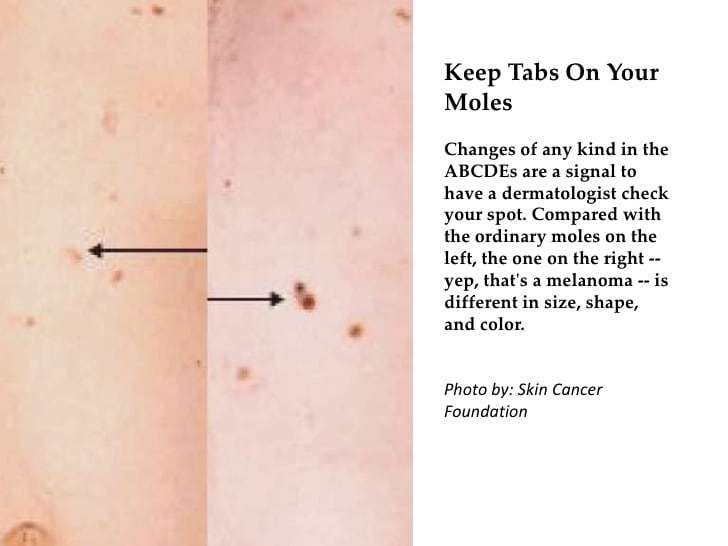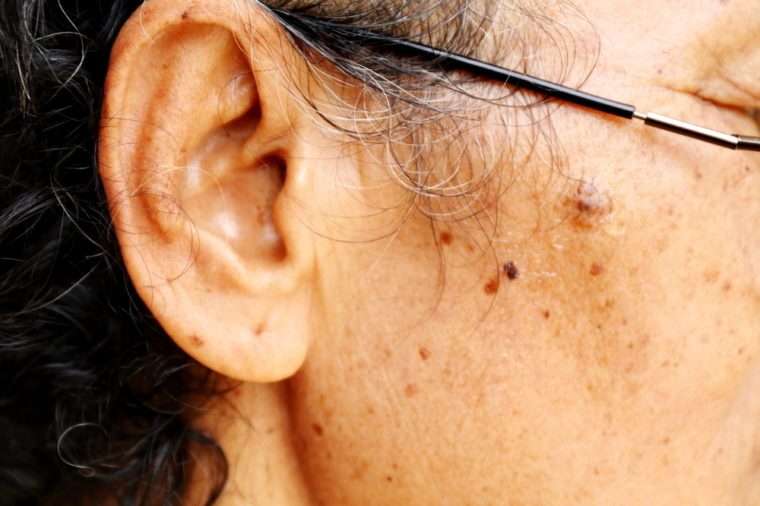Medical Treatment For Skin Cancer
Surgical removal is the mainstay of therapy for both basal cell and squamous cell carcinomas. For more information, see Surgery.
People who cannot undergo surgery may be treated by external radiation therapy. Radiation therapy is the use of a small beam of radiation targeted at the skin lesion. The radiation kills the abnormal cells and destroys the lesion. Radiation therapy can cause irritation or burning of the surrounding normal skin. It can also cause fatigue. These side effects are temporary. In addition, a topical cream has recently been approved for the treatment of certain low-risk nonmelanoma skin cancers.
In advanced cases, immune therapies, vaccines, or chemotherapy may be used. These treatments are typically offered as clinical trials. Clinical trials are studies of new therapies to see if they can be tolerated and work better than existing therapies.
If You Think You Might Have Skin Cancer
If you think you might have skin cancer, go to the doctor! Any time you suspect that you may have cancer of any kind, your first step should absolutely be to see the doctor. Take care of yourself and your health. However, if you are trying to clear up some skin issues that may or may not be skin cancer-related, I know a gal who had great success with baking soda and coconut oil.
What To Do If You Have Skin Cancer
With the number of people diagnosed with skin cancer continuing to increase, I think it is essential for everybody to be prepared to be informed that they have skin cancer and/or precancerous sores. Due to the fact that many individuals discover the word cancer to be frustrating, I want to help you be prepared and form the best concerns to ask your dermatologist if you are detected with skin cancer.
Also Check: Tumor Calcification
Different Types Of Cancer Start In The Skin
Skin cancer may form in basal cells or squamous cells. Basal cell carcinoma and squamous cell carcinoma are the most common types of skin cancer. They are also called nonmelanoma skin cancer. Actinic keratosis is a skin condition that sometimes becomes squamous cell carcinoma.
Melanoma is less common than basal cell carcinoma or squamous cell carcinoma. It is more likely to invade nearby tissues and spread to other parts of the body.
This summary is about basal cell carcinoma, squamous cell carcinoma of the skin, and actinic keratosis. See the following PDQ summaries for information on melanoma and other kinds of cancer that affect the skin:
Seek Comprehensive Care If Your Skin Cancer Is Complicated To Treat

Complicated skin cancer may require the expertise of multiple specialists. Plastic surgeons may get involved when the cosmetic challenges are significant. An ocular surgeon or an oculoplastic specialist may be needed if you have an especially difficult-to-treat skin cancer close to the eye. A head and neck surgeon may join your care team if there is nerve involvement or if the cancer is too extensive for local anesthesia.
The beauty of a comprehensive cancer center like MSK is that the expertise is all here, says Dr. Lee. We have a multidisciplinary program especially for people with complex skin cancer. You can usually see all of your doctors on the same day and in the same location. The dermatology team works with you to coordinate your appointments with your schedule.
You May Like: Does Amelanotic Melanoma Blanch When Pressed
After Squamous Cell Cancer Of The Skin Has Been Diagnosed Tests Are Done To Find Out If Cancer Cells Have Spread Within The Skin Or To Other Parts Of The Body
The process used to find out if cancer has spread within the skin or to other parts of the body is called staging. The information gathered from the staging process determines the stage of the disease. It is important to know the stage in order to plan treatment for squamous cell carcinoma of the skin.
Basal cell carcinoma of the skin rarely spreads to other parts of the body. Staging tests to check whether basal cell carcinoma of the skin has spread are usually not needed.
The following tests and procedures may be used in the staging process for squamous cell carcinoma of the skin:
Seek A Definitive Diagnosis Early
You should seek a definitive diagnosis early if any of the following changes occur in your skin:
- You have a new growth or a wound that isnt healing
- Theres a spot on your skin that looks different than everything else
- You notice a change in an existing mole or birthmark
- If you discover an area of skin that scales, bleeds, turns red, or changes in any way
You May Like: What Does Stage 3b Melanoma Mean
How To Find A Gp
If you dont have a GP, you can find a doctors surgery in your local area by going to:
Try different times of the day if it’s difficult to get through by phone. It could be particularly busy at the beginning of the day. You dont have to tell the receptionist what you want to see the doctor for, although sometimes it might help to explain your situation.
You might be able to go in person to book an appointment at some GP practices. But at the moment most practices do not provide this service. It may help to see if your GP practice has a website, this will explain the best way to get an appointment.
The receptionist at your GPs practice will usually offer you a telephone or video appointment first. Your GP will ask you to make another appointment if they need to see you again. You may be asked to attend in person, especially if they need to examine you. The receptionist will give you a date and time for this.
Accept a booked appointment, even if you think its a long time to wait. You could ask about cancellations if you are able to get to the practice at short notice. Do check that they have the right contact details for you, including your telephone number and email.
Spotting The Symptoms & Diagnosing Skin Cancer With Rwjbarnabas Health
When it comes to properly treating conditions like melanoma or skin cancer, its imperative that patients receive an accurate diagnosis. At RWJBarnabas Health, our physicians and cancer treatment professionals are some of the leading experts in New Jersey when it comes to spotting the symptoms and then finding the proper course of treatment.
Since skin cancer is the most common cancer in the United States, it is important to know the signs of skin cancer and melanoma symptoms. Detecting cancer at its earliest stage gives the best chance of successful treatment.
Often, skin cancers do not cause bothersome symptoms until they have grown quite large. However, it may be possible to see or feel skin cancers in their early stages. Most general physicians include a skin exam during yearly wellness visits if you think you need a screening, be sure to ask for one.
Also Check: What Stage Is Invasive Lobular Carcinoma
Can You Get Skin Cancer From Just One Sunburn
Even though I grew up in sunny Florida, I was still fairly prone to sunburns especially on annual family vacations, when Id spend hours with my cousins playing in the ocean and emerge with bright red burns that sometimes blistered and always hurt. Even though this only happened about once a year, my mom would tell me that one bad sunburn meant I was X-percentage more likely to get skin cancer in the future. In my memory, this percentage swings from 20% to 50% or even 80%.
Even though my mom wasnt a dermatologist, I should have listened to her pleas for me to wear sunscreen and be mindful of my future skin and health. As I got older, I often thought about the statistics she shared, wondering if she was correct or being a little melodramatic. Everyone gets sunburned every now and then, right? How bad could it really be?
According to dermatologists, its far from OK. And my moms statistics actually werent far off.
It is believed that one blistering childhood sunburn doubles your risk of developing melanoma later in life, said Boca Raton-based dermatologist Jeffrey Fromowitz, citing a statistic thats backed up by research and the Skin Cancer Foundation. Fromowitz also shared that five or more typical sunburns also double the your risk of developing melanoma, the most dangerous and deadly type of skin cancer.
Can Skin Cancer Be Prevented
In most cases, skin cancer can be prevented. The best way to protect yourself is to avoid too much sunlight and sunburns. Ultraviolet rays from the sun damage the skin, and over time lead to skin cancer.
Here are ways to protect yourself from skin cancer:
- Seek shade. Don’t spend long periods of time in direct sunlight.
- Wear hats with wide brims to protect your face and ears.
- Wear long-sleeved shirts and pants to protect your arms and legs.
- Use broad-spectrum sunscreens with an SPF of 30 or higher that protect against burning and tanning rays. Apply the sunscreen 30 minutes before you go outside.
- Wear sunglasses to protect your eyes.
- Use a lip balm with sunscreen.
- Avoid the sun between 10:00 a.m. and 4:00 p.m.
- Show any changing mole to your healthcare provider.
Don’t Miss: Squamous Cell Carcinoma Scalp Prognosis
What Exams And Tests Diagnose Skin Cancer
If you have a worrisome mole or other lesion, your primary-care provider will probably refer you to a dermatologist. The dermatologist will examine any moles in question and, in many cases, the entire skin surface.
- Any lesions that are difficult to identify, or are thought to be skin cancer, may then be checked.
- A sample of skin will be taken so that the suspicious area of skin can be examined under a microscope.
- A biopsy can almost always be done in the dermatologist’s office.
If a biopsy shows that you have malignant melanoma, you will probably undergo further testing to determine the extent of spread of the disease, if any. This may involve blood tests, a chest X-ray, and other tests as needed.
Skin Color And Being Exposed To Sunlight Can Increase The Risk Of Basal Cell Carcinoma And Squamous Cell Carcinoma Of The Skin

Anything that increases your chance of getting a disease is called a risk factor. Having a risk factor does not mean that you will get cancer not having risk factors doesnt mean that you will not get cancer. Talk with your doctor if you think you may be at risk.
Risk factors for basal cell carcinoma and squamous cell carcinoma of the skin include the following:
- Being exposed to natural sunlight or artificial sunlight over long periods of time.
- Having a fair complexion, which includes the following:
- Fair skin that freckles and burns easily, does not tan, or tans poorly.
- Blue, green, or other light-colored eyes.
- Red or blond hair.
Although having a fair complexion is a risk factor for skin cancer, people of all skin colors can get skin cancer.
Older age is the main risk factor for most cancers. The chance of getting cancer increases as you get older.
Don’t Miss: Can You Die From Basal Cell Skin Cancer
How Fast Should I Make Decisions
With skin cancer, its important to act but not so fast that you miss opportunities to listen to the recommended treatment plan and consider any questions you may have. The first step is typically scheduling an appointment with a skin cancer oncologist who will consult with his/her team to give you their best recommendation.
The skin cancer experts at Arizona Oncology are here to serve you with care, both physically and emotionally, as you journey through dealing with skin cancer.
Will Scan Ease Back Ache Worries
Question: IVE had disc problems in my back for many years. This time its really bad, with back pain and sciatica down my leg. Im worried its serious should I ask for a scan?
Jeanette, by email
Answer: Its certainly worth discussing it with your GP. Most bad backs dont need scans. Thats because the symptoms usually get better on their own, and scans dont give much useful information.
There are two exceptions. One is if the back pain might be caused by something serious like cancer.
This is rare. Clues include severe pain getting worse over weeks or months with no let-up and no improvement with painkillers. The pain may repeatedly wake you at night and you might also be generally unwell losing weight, say.
The other exception is if your doc suspects a slipped disc. This disc can press on a nerve typically the sciatic nerve causing pain down your leg.
Most of these improve given time. But if it goes on for months, a scan is a good idea because you might need an op.
The scan will help confirm the diagnosis and pinpoint for the surgeon exactly where the problem is.
Question: I HAVE long-term varicose veins from my knee down to my foot. Over the last few months,
Ive noticed a brown pigment on the front of my shin. Ive tried various creams but nothing gets rid of it.
Mick, by email
pigment in your skin. Unfortunately, this staining is permanent.
Question: With every meal, I have a problem with food sticking. What should I do about this?
Fred, by email
You May Like: Squamous Cell Stage 4
Skin Cancer Is A Disease In Which Malignant Cells Form In The Tissues Of The Skin
The skin is the bodys largest organ. It protects against heat, sunlight, injury, and infection. Skin also helps control body temperature and stores water, fat, and vitamin D. The skin has several layers, but the two main layers are the epidermis and the dermis . Skin cancer begins in the epidermis, which is made up of three kinds of cells:
- Squamous cells: Thin, flat cells that form the top layer of the epidermis.
- Basal cells: Round cells under the squamous cells.
- Melanocytes: Cells that make melanin and are found in the lower part of the epidermis. Melanin is the pigment that gives skin its natural color. When skin is exposed to the sun, melanocytes make more pigment and cause the skin to darken.
Skin cancer can occur anywhere on the body, but it is most common in skin that is often exposed to sunlight, such as the face, neck, and hands.
Getting The Most Out Of Your Gp Appointment
It can be difficult to remember everything you want to say and ask when you see the doctor. These tips will help you get the most out of your appointment:
- Write down your symptoms including when they started.
- Tell your GP if you’re worried about cancer in particular.
- Tell your GP if you have a family history of cancer or any other medical conditions.
- Take a friend or relative along for support – they could also ask questions and help you remember what the GP says.
- Ask the GP to explain anything you dont understand.
- Ask the GP to write things down for you if you think this might help.
- If you have taken photos of your skin remember to take these along with you.
You May Like: How Do You Die From Melanoma
Finding Skin Cancer Early
When skin cancer is found and treated early, the chances of successful treatment are better. Get regular health checkups and see your doctor if you have any symptoms or are worried about your health.
If you have a higher than average risk, you may need to visit your doctor more often to check for skin cancer. Talk to your doctor about what can help find skin cancer early including checking your skin and having skin exams by a trained health professional.
You Think You Have Skin Cancer What Should You Do First
Generally, you would first contact your primary care physician and share your concerns. If your PCP is concerned then you will likely be referred to a dermatologist, a skin specialist. The dermatologist will often be the one to diagnose your skin cancer. There are different types of skin cancer and the treatment will depend on the type of cancer as well as other factors such as your overall health, the location of the cancer, and results of other testing such as a biopsy.
You May Like: What Does Stage 3b Melanoma Mean
Keep Notes And Records
Before you see an oncologist we suggest you purchase a special notebook and folder where you can take notes and keep your paperwork together regarding your skin cancer diagnosis. You should start this notebook as soon as you are diagnosed to jot down questions, dates, testing and medication regimens, and how you are feeling. Its also a good idea to bring someone with you to the appointment for support and to help you recall the conversation later.
Biological Therapies And Melanoma

Biological therapies are treatments using substances made naturally by the body. Some of these treatments are called immunotherapy because they help the immune system fight the cancer, or they occur naturally as part of the immune system. There are many biological therapies being researched and trialled, which in the future may help treat people with melanoma. They include monoclonal antibodies and vaccine therapy.
You May Like: How To Identify Basal Cell Carcinoma